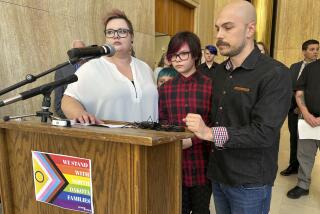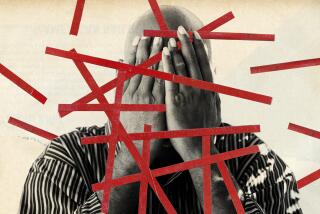Judge Denies Bouvia Appeal for Order to Halt Force Feeding
- Share via
A Los Angeles Superior Court judge refused Friday to halt the force-feeding of quadriplegic Elizabeth Bouvia and ruled that, under the circumstances of her present hospitalization, she does not have an absolute right to refuse medical treatment.
“It is fairly clear from the evidence . . . that (Bouvia), during her stay (in the hospital) and for some time prior thereto, has formed an intent to die,” Judge Warren Deering said in his written ruling.
“She has voiced this desire to a member of the staff of defendant hospital. She claims, however, she does not wish to commit suicide. On the evidence,” the judge wrote, “this is just a semantic distinction.”
Videotape Statement
Bouvia, who lost a legal battle to be allowed to starve herself to death two years ago in a Riverside court, told Deering’s court last week in a videotaped deposition that she has not changed her mind about wanting to die but no longer intends to starve herself to death.
On being told of the denial of her request for removal of the nasogastric tube through which she is being force-fed, Bouvia was “extremely disappointed and surprised,” attorney Richard Scott, a member of the legal team representing her, said.
“Oh, my God, that doesn’t make any sense,” Scott said the 28-year-old cerebral palsy victim told him over the phone after the ruling. “I have been eating all I can before they did this.”
Scott said the ruling will be appealed Monday. “I think it is absolutely clear-cut law that people have the right to refuse medical care,” he said. “She is not trying to starve herself to death. What we are trying to do is get the tube out of Elizabeth Bouvia’s nose and throat and stomach.”
Action by Doctors
Lawyers for the county-operated High Desert Hospital in Lancaster where Bouvia is a patient had argued that doctors initiated force-feeding to prevent a life-threatening situation, believing Bouvia’s liquid diet intake of 500 to 700 calories a day was not sufficient to maintain her.
Scott had argued that the doctors had based their decision on a nutritionist’s scale of nutrients calculated for ideal body weight. “Elizabeth Bouvia does not have an ideal body,” he said. “She has maintained her present weight (about 74 pounds) on that diet for a year. The idea of giving her 2,200 calories was not only wrong but dangerous.”
Deering was not persuaded. In his 11-page ruling he noted that he had considered the depositions of five physicians as well as those of the plaintiff and others, and determined that the tube-feeding procedure “was necessary and was the most feasible, reasonable means of preventing a life-threatening situation.”
Deering said the “reasonable inference to be drawn” is that Bouvia “has purposefully engaged in a selective rejection of medical treatment and nutritional intake to accomplish her objective and to accept only treatment which gives her some degree of comfort pending her demise.”
Deering recognized that the law has established patients’ rights to refuse medical treatment and he noted that the development of the rights of privacy may “possibly” have reached a point “where rational persons unafflicted with a terminal catastrophic condition have the right, without the state’s assistance or preventive intervention, to intentionally terminate their life by refusal of medical care.”
Method of Demise
But in Bouvia’s case, he wrote, she “wishes to pursue her objective to die by the use of public facilities with staff standing by to furnish her medical treatment to which she consents and to refrain from that which she refuses.
“Under the circumstances, the state has at least an equal interest to that of plaintiff,” Deering wrote. He noted that people may not withhold consent to a medical procedure--such as vaccinations--when the public health would be affected.
Yet Bouvia “appears to assert an absolute right to refuse antibiotics or other medical procedures to inhibit or eliminate infection she may develop which, despite isolating her, might spread to other patients or to the staff.
“The court does not believe (she) has such an absolute right and so finds.”
Outlook for Survival
The ruling notes that Bouvia’s cerebral palsy is stationary, not progressive or terminal, that it cannot be corrected by surgical or medical means, and that, with reasonable care, she has a life expectancy of another 15 to 20 years.
She requires continuing care and assistance, Deering noted, but added that Bouvia is free to leave the hospital.
“Unfortunately, despite efforts of all concerned, she cannot find another facility to accept her.”
More to Read
Sign up for Essential California
The most important California stories and recommendations in your inbox every morning.
You may occasionally receive promotional content from the Los Angeles Times.













